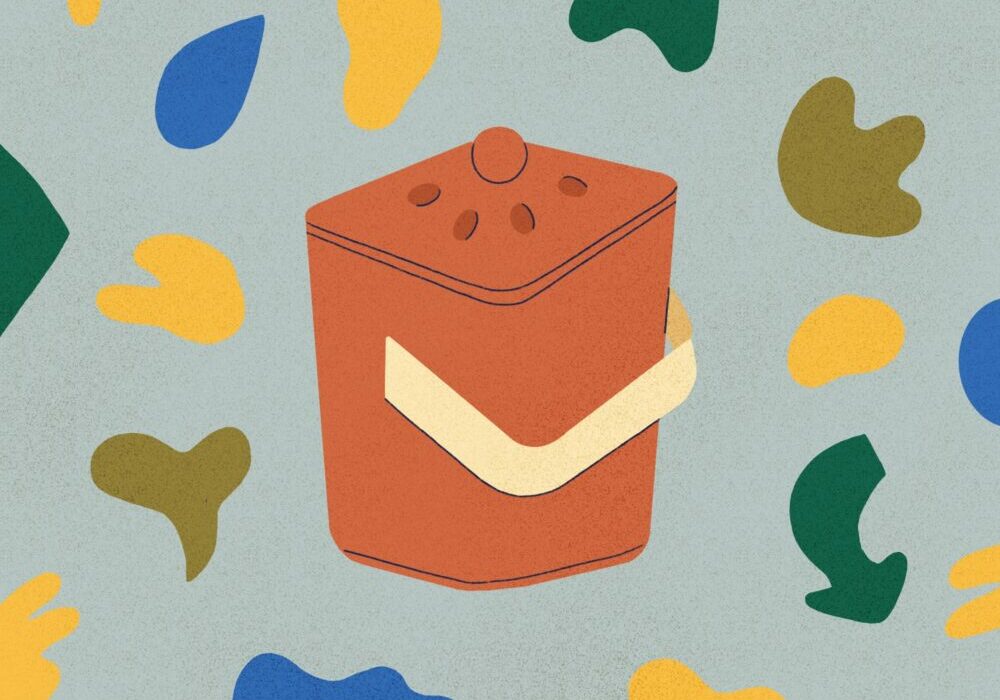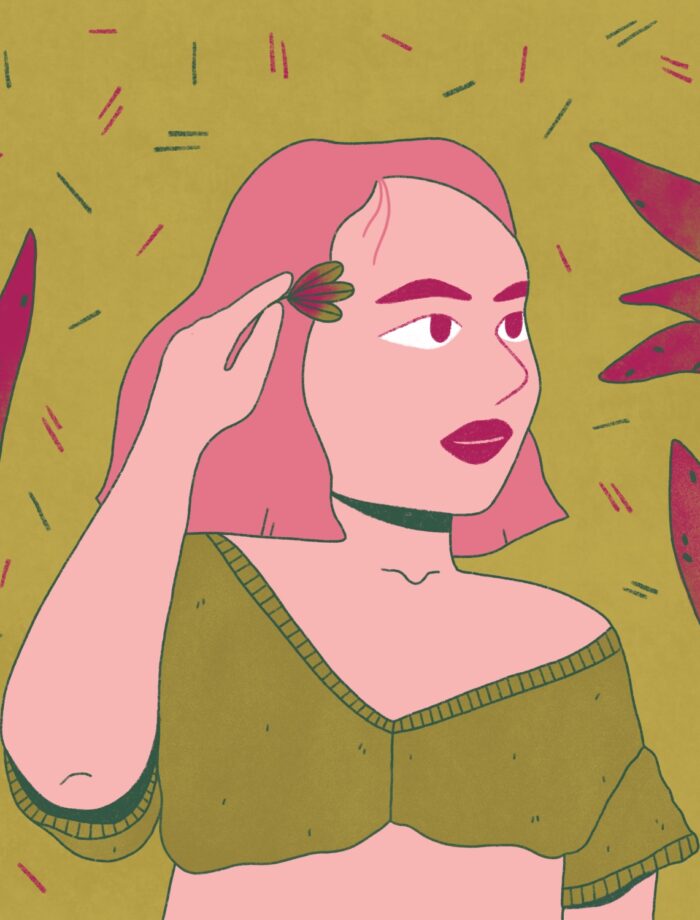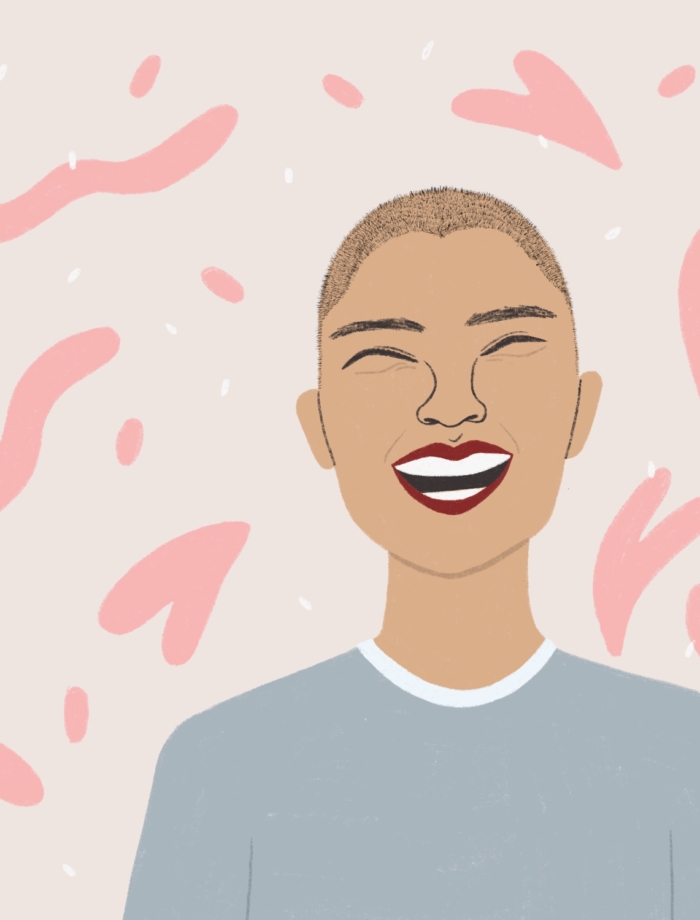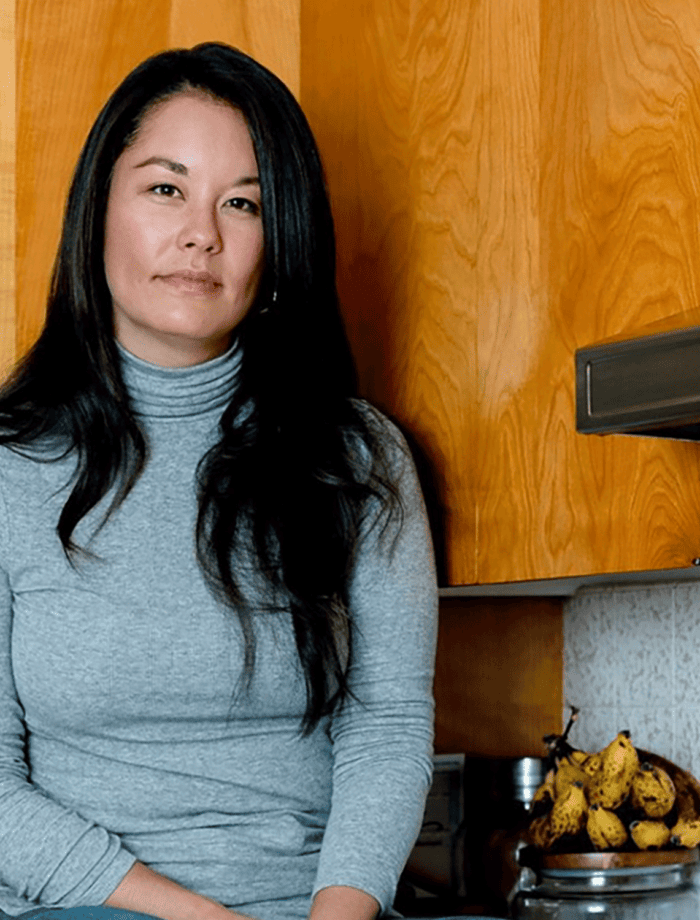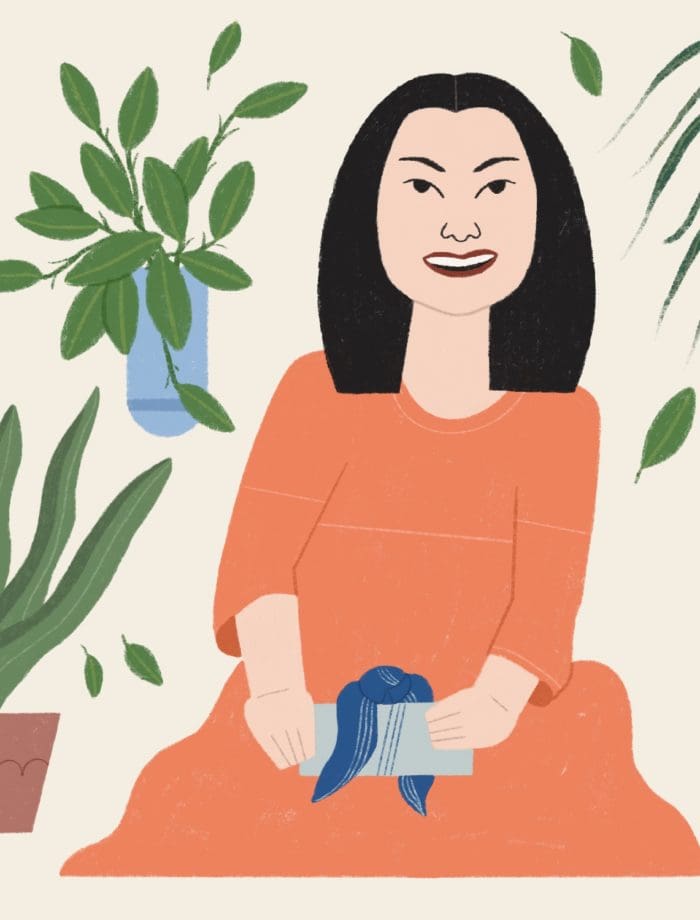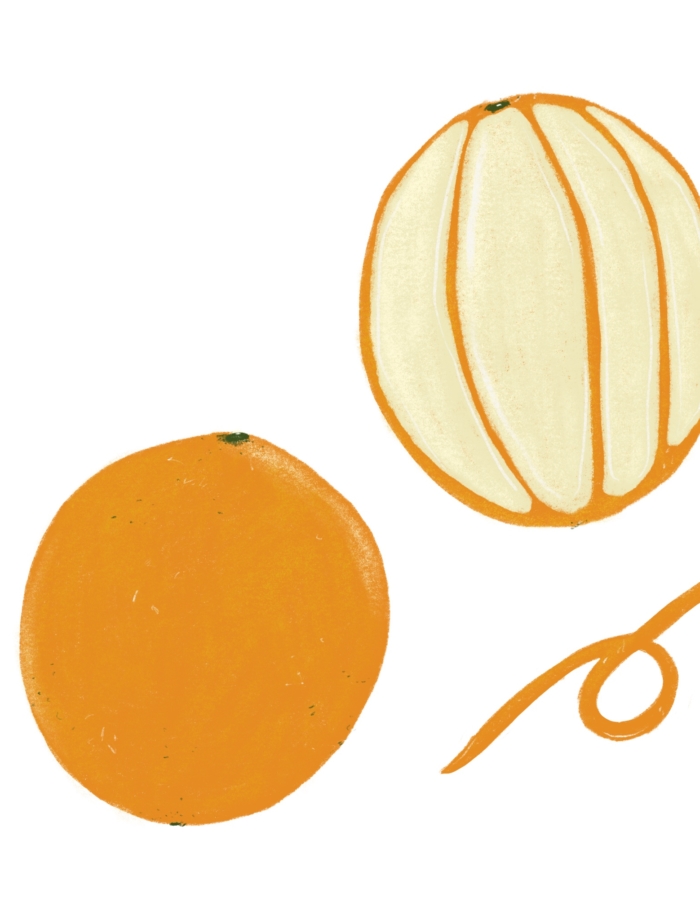Illustration by Hawnuh Lee.
In the spring of 2020, Azora Zoe Paknad had no intention of launching a business, let alone a fully sustainable online marketplace of design-forward home and wellness products. But as of February 2021, her startup Goldune is already changing the game, making sustainable shopping more inclusive and less beige.
Azora Zoe doesn’t claim to be a sustainability expert, but her eye for color, whimsy, and great design is unmistakable. That paired with plenty of enthusiasm and tireless research has made for an online shopping experience that is both better for the planet and easy on the eyes.
Here, she shares how Goldune went from idea to reality in the span of just a few months, how she decides what companies to partner with, some current favorite sustainable products, and loads more.
Can you tell me about your background and life before Goldune?
Before I launched Goldune, I’d spent the last ten years living in New York City, and the last five working at Food52. It was a really interesting startup environment when I started, in five years there I got to wear many different hats and try many different things, which was awesome. It was a great way to figure out what I was good at and what I was passionate about, and what sat in the middle of those.
I had decided that 2020 was going to be the year that I took a break from startup life. I was feeling burnt out by city life and long weeks of work and thought I was going to spend the year exploring the world, getting in touch with myself, and figuring out what’s next. I gave my notice at Food52 at the beginning of the year and was planning to leave in March. I thought I was going to go to Italy. Of course, March rolled around and everything changed. I ended up doing the absolute opposite of everything I had planned — I moved back in with my parents in Northern California where I’m from and haven’t lived since I was a teenager.
Living sustainably is a privilege, but a lot of times it’s made to feel like a sacrifice. Who gets excited about a privilege or feels privileged when the rhetoric makes it feel like a sacrifice?
In New York, I was very into living sustainably, but I wasn’t really able to get past reusable to-go items and things like that because of the lifestyle of the city. I was feeling very disconnected from nature. My parents now live in this rural suburb so I’m currently living above a farm and seeing the animals every day. In many ways I’m getting to do what I wanted and needed, but it wasn’t in the way that I ever would have planned for. Because the year went so much differently than I expected, I had a lot of time to incubate those thoughts, and that’s where the idea for Goldune came from. I don’t know, truthfully, if I would have had the idea if I hadn’t had all of that time and space to notice things.
As I was learning more about sustainability, there were a few things that really bugged me about how the landscape looked. First and foremost it was that living sustainably is a privilege, but a lot of times it’s made to feel like a sacrifice. Both in product design and the way we talk about it. Who gets excited about a privilege or feels privileged when the rhetoric makes it feel like a sacrifice?
I also felt like the representation was pretty wonky. Particularly, I spent a lot of time on Instagram, and the voices that I saw that were dominant in the slow living or zero waste spaces on IG were mostly waiflike white influencers wearing very expensive hemp slow fashion. I looked at that and thought, ‘Well, that’s not me and it’s probably never going to be.’
And then on the other side of the spectrum, there was a lot of hardcore zero waste rhetoric that felt really exclusive. And I think it maybe took the events of 2020 to see the fractures in that — how unrealistic it is to demand that of people. I certainly gave it my best shot at going fully zero waste but it’s so hard! It’s a very granola visual culture, and I like color and brightness. I’m also mixed-identity and mixed-ethnicity, and having everything be bamboo or beige also sort of felt like an abandoning of my culture and my values and the things I grew up with.
So that was the friction I encountered. I kept seeing more of those cracks and learning more about accessibility and witnessing the experiences of my friends, family, and peers who lost jobs last year or were working 80 hours a week to provide for a family. All of those people wanted to do a little bit better by the earth but the all or nothing mentality wasn’t serving them. It wasn’t offering a comfortable or safe place for them to start that fit into their values or aesthetic. All of that started slow cooking in my brain during that time and eventually led to Goldune.
You said you were into living sustainably in NYC. When and why did that become part of your life?
It first started with clean beauty, which now I have mixed feelings about. Back then the fearmongering around like, ‘Is my face cream going to kill me?’ really got to me. I went fully down that spiral and eventually got into curating products — recommending or trialing for friends and coworkers, and I started an IG account and a newsletter all about different products I was testing.
What I realize now is that whatever angle you come at it from, once you start looking at something like the packaging of your skincare products, it’s only a matter of time until you start thinking about the rest of your home and lifestyle. It felt kind of oxymoronic or silly to care about how my face wash was bottled but not care about how my counter spray or laundry detergent was packaged.
That also dovetailed nicely with some of the work we were doing Food52. We launched a D2C brand in my last two years there and developed some sustainability leaning products — things like silicone straws or lids intended to replace single-use plastic wrap. That was by no means the sole focus of the business, but it was a great way for me to see what I loved most about the process, and really geek out about details like printing with bio ink on the packaging. It was a blending of personal and professional interests that ultimately made me realize it was something I wanted to do more of. I made the decision that whatever my career ended up being it had to include or speak to sustainability.
What was it like launching in such a short amount of time as a one-person operation?
It was very hard. I don’t know if I would recommend starting a business solo in 2020 — I don’t know if I’d give it a 5-star review. But I did it.
From June to October — the time between when I had the idea and decided to commit to it and when the brand launched — wasn’t even the hardest part. The week before launch was pretty wild — a lot of sleepless nights and chaos and never leaving my desk chair. But besides that it was great, because I got to do a lot of dreaming and being creative. I loved getting to think about the what if’s and slowly aligning that with the operational steps.
I would so much rather work with a small business that shares our goals and is going to grow with us, hold us accountable and vice versa, as compared to a big CPG company with massive scale.
The true challenge began when we went from being a figment of my imagination to a business with customers. We launched Oct. 20th and just a few weeks after that was the election, and just a few weeks after that was Black Friday / Cyber Monday and the whole ‘ship-mageddon’ thing. It was a really wacky quarter and I’m only just absorbing that now — reminding myself that not every day or week of my life is going to be like that. But yeah, I definitely recommend having a co-founder or business partner, or even a life partner to lean on, or an advisor of some sort if you are taking on an entrepreneurial pursuit in quarantine. Right now I don’t have any of those things and I think I’m a little worse off for it.
What standards or process do you use to curate the products you stock?
I get this question a lot, and I think people are eager for a black and white ‘buy this, not that’ kind of answer. But sustainability is so nuanced. We often fixate on packaging because that’s what our eyes can see, but we can’t see what kind of energy was used in manufacturing, or the associated carbon tax of shipping that item at that weight or size. We don’t see how each glass bottle gets filled — does that require the addition of three or four other machines? We don’t know. And it’s totally fair for us to not know these things, it’s actually sort of kooky to think that we would. Being a conscious consumer is already a lot of work, imagine adding on additional layers of understanding. But all of those elements do play into whether or not something is sustainable. So curating products for us is less of a clean checklist and more of a holistic conversation with founders.
For the most part, the businesses we work with are small, almost all women-owned, and a good portion POC-owned. Getting to talk with small business owners personally and gaining a better understanding of where they source their materials from or how they are made (often times they’re made at home or in a small studio), that’s a lot easier to wrap my brain around. We’re able to get a sense of how we can work together to be as sustainable as possible — reaching whatever minimum volume allows them or us to graduate to the next tier of sustainable packaging or manufacturing, etc. But also at the end of the day, I would so much rather work with a small business that shares our goals and is going to grow with us, hold us accountable and vice versa, as compared to a big CPG company with massive scale. And for what it’s worth, those companies don’t really want to work with Goldune either haha.
When you buy from small businesses you often have the opportunity to have conversations with the owners or makers, and they can honestly answer your questions. It’s often their pleasure to get to explain to you how something is made.
We have a pretty complicated intake and onboarding questionnaire where we get to the root of things as minute as what kind of energy is used in their office and manufacturing plant or studio. That helps us get a sense of what everyone’s goals are and how we can grow together.
That said, there are also some very clear criteria. We try not to use any virgin single-use plastic. And we try to make sure that items all have a really tangible or concrete end of life, whether we collect them, or they can be composted or are biodegradable..
It can be so overwhelming as a consumer when you start to spiral into all of that, which is why it’s so great that you are doing some of that work for your customers. I’m curious whether there’s anything you’ve learned or changed your mind about through having these conversations with the makers?
Oh, so many! I came into this not as an expert at all. I was a hobbyist. I *liked* sustainable living. I had a lot of reckoning to do and imposter syndrome-ing to get through to even get to the point where I could declare myself to be a sustainability-oriented founder. A lot of people get degrees in this stuff so I felt a little out of place or like I lacked the chops because I didn’t have any training technically. But honestly, I’ve never had technical training for anything I’ve done professionally, I’ve always learned by trying and doing.
I learned a lot about bamboo. Bamboo is probably the most versatile material that we work with and stock, and we sell it in so many different forms, whether it’s bamboo lyocell bedding or bamboo composite dinnerware… it’s super adaptable and a really renewable material. But I kind of had a bias against it coming in! It’s so crunchy, so beige, very granola. Kind of the opposite of everything I wanted to do. I really wanted to be focused on design and brightness and color and all the things you don’t see in sustainable products that often. But it turns out bamboo can certainly be all of those things and more, and is a really interesting source material. Of course there are many others too, but I find that bamboo pops up in my work literally like 80 times a day and it makes me wonder why we’re not all using bamboo all the time instead of plastic.
Aside from shopping at Goldune, what advice would you give someone who wants to be a more conscious and sustainable consumer?
We’re living in an era where a lot of the companies that claim to be radically transparent or sustainable are getting called out for greenwashing or not supporting diversity and inclusion in their organizations. Sometimes the radical transparency promise is not as transparent as it seems. I would focus on shopping small. When you buy from small businesses you often have the opportunity to have conversations with the owners or makers, and they can honestly answer your questions. It’s often their pleasure to get to explain to you how something is made. I spend a lot of my day messaging back and forth with people on Instagram, and I love it because I can have conversations like the ones I had with my friends before I started this business. I can tell someone ‘I think this is the right compost container for you out of these four options based on everything you’ve told me about your home or what you’re looking for.’ I think generally shopping small might not always be sustainable, but it certainly does less harm and you can at least get a real impression of who you’re supporting with your dollars.
What’s your favorite product you sell at Goldune right now?
This is so tough, and it changes every day — these days I am adding new products every day too. Today, it’s our Biodegradable Sponge, Scrub + Brush Set, which I think is pretty handsome and a really good deal. It comes to us by way of a WOC owned business, Sqwishful, who we’ve partnered with since day one. And not only are the products well designed, they’re also all made of renewable and biodegradable resources.
Most slept on product on the site?
I really *love* our neon, hand blown glass reusable straws and think they’re endlessly cool and kooky. They sell pretty well, but I expected it to be explosive because of how cute they are!
One scrappy sustainability tip that doesn’t require spending any money?
Vote for climate, read books (Inconspicuous Consumption by Tatiana Schlossberg or Climate Justice by Mary Robinson are my two picks right now), follow Greta Thunberg on Twitter.
Favorite meal to make for yourself recently?
I really adore Dan Pelosi (perhaps you know him as @grossypelosi) and had doubts about his vodka sauce — it was pretty different from the way I’d been making it. But I was wrong. Dan was right. Honestly, Goldune keeps me so busy I don’t have much time to cook — but when I do find myself with an hour on a Friday night, it’s Dan’s vodka sauce that I crave.
Something sustainability related that you’ve been wondering about lately?
I wonder a lot about what it will take to get fossil fuel corps to actually shut that shit down. Genuinely, I only mostly wonder what it will take for conservative folx to stop denying climate change. Hurricanes, wildfires, and rising temps and sea levels apparently aren’t as convincing as money and power.
One sustainable living goal you have for yourself for this year?
Make Goldune famous, get more compost bins into the hands of more people, get more people feeling excited about sustainability. I wish I had time or space to have more goals, but that one consumes my entire life and feels like a pretty big sustainability goal as is.
One goal or intention in general you have for yourself for this year?
Close a round of funding for Goldune so we can commit to being a fully circular business by the end of 2021.
Thank you so much, Azora Zoe!
Be sure to check out Goldune next time you’re in the market for a stylish compost bin, super cute sponges, or a shampoo bar for your dog. Through march only, Goldune is also hosting The Shelf, a pop-up for sustainable snacks, including upcycled goodies from our sweet friends at Renewal Mill!
Stay hungry <3
CLC might make a small commish from products linked here. So we can keep crafting rad content for free!
